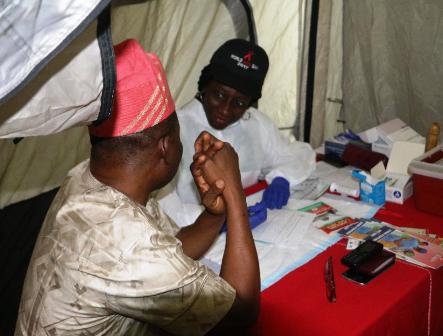NASS launches trust fund to combat HIV/AIDS
-
IHVN conducts free screening for staff

Nigeria is sure to have more locally-sourced funds to combat HIV/AIDS as the country’s federal legislators on Monday December 4th 2017 launched the National Assembly Coalition Against HIV/AIDS (NASSCOA) and Wellness Trust Fund (WTF) to help combat the pandemic.
Comprising the House of Representatives and the Senate, the National Assembly decried the plights of sufferers from HIV/AIDS, paucity of funds for treating the patients by government and resultants deaths of the patients for over 30 years that the disease was first reported in the country.
The launch was part of activities to mark this year World AIDS Day by the National Assembly, in conjunction with Institute of Human Virology of Nigeria (IHVN) and other partners.
Senate President, Bukola Saraki, said more people die of HIV infection in Nigeria than in any other country in the world, with about 180,000 deaths very year.
Saraki, who represented by Senate Ahmed Lawan at the event which took place at the National Assembly Complex, Abuja, said Nigeria also had the largest number of newly-infected children with the condition.
“Our country contributes one in every three new infections among children globally. HIV and AIDS remain one of the biggest health problems of our society. This is an unacceptable situation, and we must all rise to onerous task of eradicating this pandemic.
“The response of the government of Nigeria against HIV/AIDS over the past 30 years has been robust and decisive. By the end of 2015, we had more than 800,000 people living with HIV and AIDS being placed on antiretroviral treatment. More than 10 million Nigerians today know their HIV status. Nigerians with HIV infection now live longer, can marry and have HIV-free children, but seems to be insufficient. More vigorous response is required to meet the 90-90-90 target of an AIDS-free generation by 2030,” he said.
Saraki said NASSCOA shall be a multi-sectoral legislative platform for waging war against HIV/AIDS in the National Assembly and constituencies, and the Wellness Trust Fund shall be a platform for mobilization of funds for such an ambition.
According to him, the National Assembly shall continue to invoke its powers of appropriation under the constitution to ensure the provision of necessary resources towards eradication of the disease.
Clerk to the National Assembly Alh Mohammed Sani-Omolori provided more insights into the expectations of the coalition.
Related Posts
According to him, the coalition is expected to lead advocacy, resource mobilization and promote partnership within and outside the National Assembly; provide technical leadership and advocacy for the implementation of prevention, control and impact mitigation strategies for HIV and AIDS in the National Assembly; co-ordinate and promote participation in sero-sentinel surveillance on incidence and prevalence of HIV/AIDS and encourage multi-sectoral and multi-disciplinary collaboration and networking among all stakeholders including civil society organizations against HIV/AIDS.
Others are: organize training of personnel involved in the control and prevention of HIV/AIDS; liaise with the National Agency for the Control of HIV/AIDS for an effective public response; facilitate the provision of care support and treatment of people living with HIV/AIDS in the National Assembly; facilitate the formation and development of local and international partnerships and collaboration for the purpose of control initiatives on the HIV and AIDS pandemic; and review, from time to time, the extent of the implementation of the strategic plan on the prevention and control of HIV and AIDS in the National Assembly.
Similarly, the Wellness Trust Fund seeks to achieve the following, according to the Clerk: mobilize funds for the prevention, treatment and care for HIV/AIDS, TB and incidental infections; ensure sustenance of funding and advocacy for the prevention and control of HIV/AIDS response at all levels; ensure sustenance of funding and advocacy for the prevention and control of HIV/AIDS response at all levels.
Omolori said Nigeria had with lived the pandemic for more than three decades, and had seen the high death toll, dislocation of many families, the reduced life spans in hard-hit countries, and the increase in child mortality and millions of children orphaned by HIV/AIDS.
“We have also seen the pain suffered by people who are stigmatized and discriminated against because of their HIV-positive status, and excluded from accessing the support care and treatment services they so desperately need.
“But, humanity has also worked hard to address the pandemic and found ways to ease this suffering. The biomedical discoveries, the global efforts in making available unprecedented funds and the expansion of preventive, treatment, care and support services to millions affected by HIV and AIDS have improved the quality of life and stabilized the pandemic in many countries.
“However, antiretroviral treatment is still not available to all who need it. Prevention messages have not been expanded to the level needed, and people with HIV are still discriminated against. Many governments have not yet put in place supportive policies for implementation of harm reduction programmes for injecting drug users. There are many more tasks we need to do.
“In Nigeria, many multi-sectoral response efforts have been hampered by lack of adequate funds. No response efforts against HIV/AIDS could be carried out without adequate funding. The National Assembly being the custodian of the powers of appropriation has great role to play in the facilitation and funding of the national response effort of the government of Nigeria,” he said.
Chief Executive Officer, IHVN, Dr Patrick Dakum, called on government of Nigeria to intensify more efforts on production of antiretroviral drugs, awareness creation and other products that could help in the containment of the HIV virus.
Represented by a Regional Manager in the organization, Dr Young Oluokun, Dakum said Nigeria needed to invest more in HIV/AIDS to be able to meet the 90-90-90 targets of eradicating the disease by 2030.
People at the National Assembly were tested free and given free gifts by IHVN within the complex.


